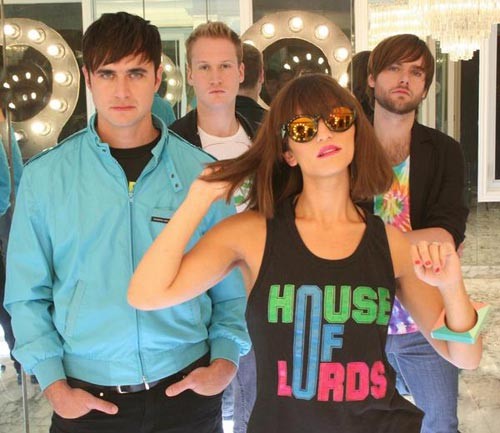
How do you make an album for the iPod generation? If your Dragonette's Dan Kurtz, you don't. You just pick the sounds and melodies that move you, hit the studio, and when you come out with a dozen of songs, you're done. It's this spontaneous spirit that's helped propel Dragonette from local Canadian sensation to global dance-rock superstars in little more than five years. The band's latest album, Fixin' To Thrill, combines singer Martina Sorbara's brash and sexy pipes with catchy riffs and rock drums that should make Dragonette's gig Friday at the Glass House a particularly explosive one. (After all, Kurtz and Sorbara are married.) In this interview, Kurtz talks about his love for Abbey Road, working with Cyndi Lauper, and how Dragonette amp up their live sound to go head and shoulders above other synth-pop soundalikes.
OC Weekly (Rich Thomas): You've picked some interesting songs to feature on your Myspace. Fixin' To Thrill has these aggressive, Justice-like synth patterns, but there's an electric banjo jamboree thing going on in “Gone Too Far.”
Dan Kurtz: I do read people's comments about us being all over the map, sometimes in a positive way and sometimes in a negative way. I think the only reason we do it the way we do it is because we're not strategic enough songwriters to go, “This is the range inside which we work.” I listened to a Deadmau5 record the other day and I was like, “Wow, this is so consistently him from track to track,” and that's really amazing. I wouldn't be able to do that. I wouldn't know what sound palette to pick for 12 songs, and to have confidence that I could keep people's interests for that long. Clearly lots of people can, and maybe that's something we'll arrive at, but at the moment it's, “Throw it at the wall, see what sticks, and when we make 12 of those you have a record.” That's the strategy. It's hard to not accept the fact that the album is dead. I'd love to write an Abbey Road, but I don't think many people have the patience to even listen to records that long anymore. And so, in a way, you don't really run the risk of creating something that's so disjointed from track to track.
]
But as a band that's bubbling just under the surface, how do you benefit from these good looks and still remain best known for your own work. I'm sure some writers can focus too much on the collabs.
I think that in the grand scheme of things it can only help us. I hear what you're saying. The only thing you don't want to have happen is that this becomes a more defining part of your character or a defining feature of your band than your band itself, which I don't really think has happened.
How much of the next album have you already written?
This record, Fixin' To Thrill, was made in the wake of ending our deal with our company here and how impactful that was in our lives. We don't have any of that kind of bullshit to deal with this time. I would never have been able to predict, when we were making Fixin' To Thrill, what it was going to end up being like, especially since we were writing songs up until two days before we sent it off to the mastering plant. In terms of what we're going to do next, it's hard to know. We've written some prototypical songs for the third record, but we still have a lot of tours to go through, and invariably some things are going to happen that may shift how we approach our next record significantly.
A lot of bands that play synth-heavy music with a lot of sequenced, electronic percussion have a hard time translating that energy to the stage. I find that so much is masked in backing tracks that the live sound gets a bit hollow. How do you work against that?
That's a great question. That is probably the number one thing I think about, other than writing songs. I don't really give a shit so much about what we look like or what kind of stage we're playing on, but I do care that the original intent of the songs comes through; that the production of what makes the song work hammers as good or harder than it did on the record. The short answer to that is, when we took this record out in the summertime, I rehearsed our band everyday for a month for four hours a day, minimum. We really got everything underneath our fingers. We adapted some drum parts to be played well on live drums, where they'd be programmed on the record. We transplanted some keyboard parts to the guitar. Since I wrote and played most of the instruments on the record, I can switch between bass and keyboard and choose which parts need to be played live and rough around the edges. Then, whatever bits were essential to the track from the record, we'd sequence them. But the great thing is that there are no bullshit moments where we're a karaoke version of ourselves. You need to have a reason for people to come and see you play.
Dragonette performs with headliner Little Bootsand Class Actress at the Glass House, 200 W. Second St., Pomona, (909) 865-3802; www.theglasshouse.us. Fri., 7 p.m. (doors). $15. All ages.


Your writing style is very engaging. illplaywithyou
You’ve got a unique perspective, and I love it! hot nude cams